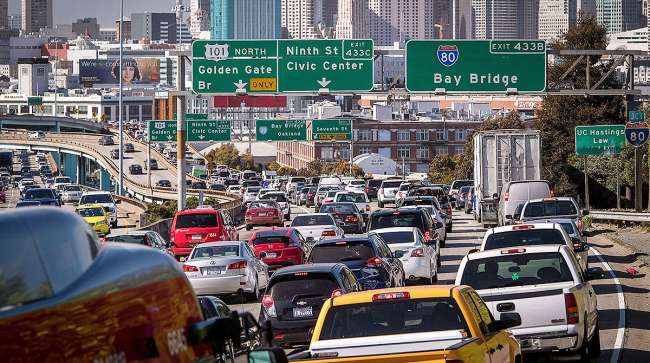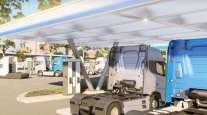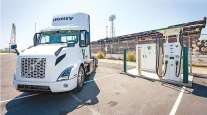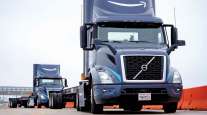Senior Reporter
Trucking Stakeholders Question CARB’s Zero-Emissions Plan

[Stay on top of transportation news: Get TTNews in your inbox.]
A plan by California environmental regulators to get zero-emissions vehicles on the road as soon as possible is getting pushback from truckers and other concerned industry stakeholders.
Some truckers are saying they’ve “seen this movie before” when the California Air Resources Board over the years implemented strict emissions requirements for heavy-duty diesel engines, and then encouraged adoption of natural gas engines.
Although California still has the nation’s dirtiest air, those past regulatory efforts — with help from the industry — have been responsible for heavy-duty truck engines that are cleaner than ever before.

But now, CARB is moving quickly to adopt a regulation to ensure that 100% of the state’s light, medium and heavy trucks and buses are operating with battery or fuel cell-electric engines by 2045. The effort is on target to begin on a graduated basis in 2024, with a requirement that a certain percentage of the trucks that manufacturers sell be zero-emissions vehicles (ZEVs). Numerous complex challenges exist to adopting the rule, but CARB staff and officials say they are confident they can reach their goal.
CARB officials claim zero-emissions trucks will provide more than just climate and health benefits. New green jobs, reduced energy use and fuel cost, lower maintenance expenses and less noise also were cited.
But the pushback was evident at a more than five-hour “kickoff workshop” held by CARB staff Feb. 12, and at a several-hourslong CARB board meeting in December that drew 100 commenters to the podium. The staff is tweaking its earlier rough draft proposal to present to the CARB board in May, with an eye toward adopting a final rule in late 2021 or 2022.
Challenges voiced by truckers and other stakeholders at the workshop and board meeting:
- Who goes first? Although the plan’s requirement will be the same for all trucking sectors and vehicle configurations, the rule almost certainly will be graduated to first require conversion by those sectors that presumably can make it quicker and less painfully.
- Manufacturers and fleets have emphasized that they need more lead time to perfect the technology and make the conversion industrywide.
- The necessary charging infrastructure must be built in time to allow the state’s 180,000 Classes 7-8 trucks to travel long distances.
- The large numbers of truck technicians needed to work on the ZEV technologies will require a major training effort.
In addition, some thorny questions have been posed by stakeholders:
- What happens if during one of the state’s wildfires electric utilities shut down the power grid?
- What revenue stream or streams can replace the billions of dollars in fuel tax revenue currently collected by the state?
- Will electric trucks be able to pull a truck with a 30,000-pound load up a 10% grade?
- What will happen to those fleets that recently have converted to natural gas trucks?
At present, the tentative plan is to begin the effort first with drayage trucks, first- and last-mile delivery services, buses and shuttle buses, refuse services, public fleet vehicles and private utility vehicles, according to CARB staff.
In part two of a two-part exploration of autonomous technology today, our latest RoadSigns podcast revisits conversations with Chuck Price of TuSimple and Ognen Stojanovski of Pronto.ai. Hear them discuss a palatable Level 2 version of trucking autonomy. Listen to a snippet above, and to hear the full episode, go to RoadSigns.TTNews.com.
Although the plan is to begin a requirement for manufacturers of Classes 7-8 tractors to sell a percentage of their offerings as zero-emissions vehicles in 2024, CARB staff said that the heaviest classes may be the most challenging sector to bring into full compliance by 2045.
At the CARB staff meeting Feb. 12, officials said they are considering a proposed graduated plan suggested by the Truck & Engine Manufacturers Association that would require 100% sales/purchases in market segments that are ready between model years 2023 and 2027.
At the CARB board meeting Dec. 12, Timothy Blubaugh, executive vice president of EMA, suggested that the plan to require manufacturers to sell a percentage of sales for all trucks as soon as 2024 is a “flawed approach.”
Blubaugh said selling a truck is a business-to-business transaction in which potential buyers look at such factors as upfront purchase costs, operational and maintenance costs, and residual values.
“If the bottom line of a fleet’s business can be enhanced with a new truck, they’ll buy it,” Blubaugh told the CARB board. “So, if they look at a zero-emissions truck and they can’t pencil it out, they simply won’t buy that product.”
Want more news? Listen to today's daily briefing:





